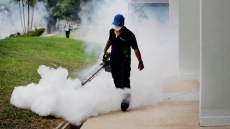New research suggests that antibodies the immune system makes to fight the new coronavirus may only last a few months in people with mild illness, but that doesn’t mean protection also is gone or that it won’t be possible to develop an effective vaccine.
“Infection with this coronavirus does not necessarily generate lifetime immunity,” but antibodies are only part of the story, said Dr. Buddy Creech, an infectious disease specialist at Vanderbilt University. He had no role in the work, published Tuesday in the New England Journal of Medicine.
The immune system remembers how to make fresh antibodies if needed and other parts of it also can mount an attack, he said.
Antibodies are proteins that white blood cells called B cells make to bind to the virus and help eliminate it. The earliest ones are fairly crude but as infection goes on, the immune system becomes trained to focus its attack and to make more precise antibodies.
Dr. Otto Yang and others at the University of California, Los Angeles, measured these more precise antibodies in 30 patients diagnosed with COVID-19 and four housemates presumed to have the disease. Their average age was 43 and most had mild symptoms.
Researchers found that the antibodies had a half-life of 73 days, which means that half of them would be gone after that much time. It dovetails with a previous report from China also suggesting antibodies quickly fade.
The results “call for caution regarding antibody-based ‘immunity passports,’ herd immunity, and perhaps vaccine durability,” the California authors write.
That’s true, Creech said, but other parts of the immune system also help confer protection. Besides churning out antibodies, B cells develop a memory so they know how to do that again if needed.
“They would get called into action very quickly when there’s a new exposure to the virus. It’s as if they lie dormant, just waiting,” he said.
Other white blood cells called T cells also are better able to attack the virus the next time they see it, Creech said.
Although circulating antibodies may not last long, what we need to know is if and how people remake antibodies if exposed to the coronavirus again and if they protect against another infection, Alison Criss, an immunologist at the University of Virginia, wrote in an email. “We also need to know if there is a protective T cell response” that reappears.
Vaccines, which provoke the immune system to make antibodies, might give longer-lasting protection than natural infection because they use purified versions of what stimulates that response, she noted.
Creech agreed.
“This shouldn’t dissuade us from pursuing a vaccine,” he said. “Antibodies are only a part of the story.”



